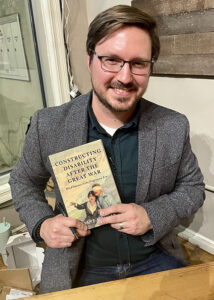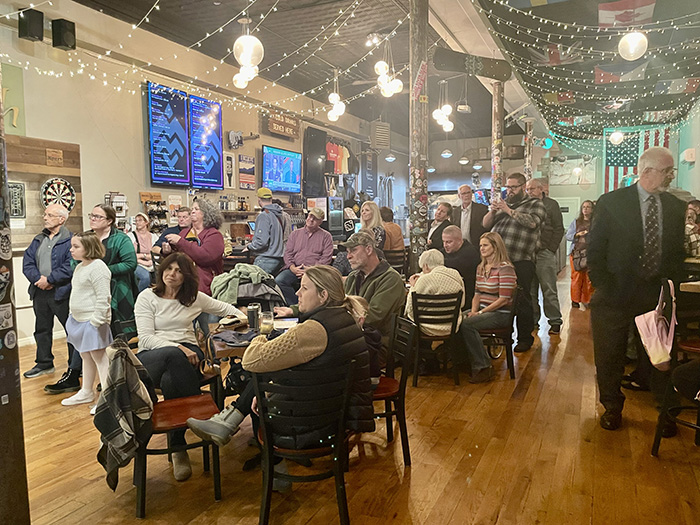By Cathy DeDe, Chronicle Managing Editor
Evan Sullivan, PhD., started out as Evan Sullivan, kid at Big Cross Elementary School in Glens Falls.
He graduated in 2008, got his Associate’s Degree at SUNY Adirondack, then continued and completed his education earning his Bachelor’s, Master’s Degrees and PhD in History from UAlbany.

Now he’s an Assistant Professor of History at SUNY Adirondack, raising a young family with wife Alex here in Glens Falls.
Last Friday night at Mean Max Brew Works in downtown Glens Falls, now-Dr. Sullivan launched his new book Constructing Disability After The Great War.
The party served also as a de facto graduation celebration. He completed his PhD. in 2020, at the height of Covid — no ceremonies allowed.
The book’s subtitle is “Blind Veterans in the Progressive Era.” It considers how American society “constructed” a story about the lives of blind veterans after World War I, mixing simple idealism and pathetic narratives, versus the veterans’ more complex actual experience.
Dr. Sullivan says the subject was sparked when he came upon a page in the wartime diary of John Finley, the New York State Education Commissioner in the early 1900s.
“He was in France studying their education policies during World War I and visited a rehabilitation hospital for blind French soldiers.
“One of the diary pages references the hospital, which piqued my interest in blind veterans. I had initially been interested in studying education during the war, and my adviser, Rick Fogarty, suggested I look at that diary…for a graduate thesis paper.”

“I am really interested in the cultural/social constructions of disability, and how societies — in this case American society in the early 20th century — constructed what it meant to be disabled (via magazines, journals, newspapers, images, etc.).
“I was initially captivated by the sentimental renderings of blind veterans from that time period, but then my research introduced me to the actual lived experiences of the blind American veterans themselves.
“These were ordinary people who just happened to be blind, happened to have been wounded in war.
“My book charts the gap between the stories American society created about disabled blind veterans, and the realities of their everyday lives.”
Dr. Sullivan says non-disabled observers put blind veterans on a pedestal, creating identities that made them either supremely sacrificial or the best representations of productive American citizenship, thus sanitizing war (and veterans’ experiences) and providing an uncomplicated narrative for post-war Americans to digest.
“My goal in writing this book was not only to highlight the sometimes absurdity of the cultural constructions of disability in this case, but also to explore the lives of the blind men as they navigated the post-war era.
“Sometimes these lives were filled with economic challenges, relationship struggles, or exciting new job opportunities, nothing really remarkably different from what people without visual impairment experienced or experience,” he says.
“Blind veterans had that additional hurdle of having to live up to idealized visions of postwar successful re-integration. To make matters worse, triumphalist narratives of veteran success suggested that blind veterans who succeeded did so solely through hard work and grit, thus ignoring the role of social, class and racial privilege.
“Additionally, left unexplored in these kinds of narratives is the responsibility of society for marginalizing disabled people to begin with, through inaccessible public and private spaces as well as stigmatizing attitudes about disability.”
Dr. Sullivan currently teaches three intro history courses at SUNY Adirondack. “In the Spring 2025 semester I am excited to be teaching History of Disability, an intro course into the field of disability history from the colonial era to the present.”
Research projects include an investigation into the lives of two women blinded during their World War I service in the Army Nurse Corps whose stories he discovered late in the writing of his book.
“It is really exciting to have graduated from SUNY Adirondack and to be back here teaching,” Dr. Sullivan says.
“I had always thought about how cool it would be to get my degree and come back. I love the area and I enjoy being close to family and friends.”
“So much of what I had envisioned as a lofty goal has come to fruition,” he says.
“I credit hard work and persistence, but also the vast support systems I have had in place with family ready and willing to help out when I’ve needed it.
“I love being here at Adirondack, serving [as the youngest member] on the board of the Chapman Museum, and being able to raise our family where I grew up. It is a dream come true.”
Copyright © 2024 Lone Oak Publishing Co., Inc. All Rights Reserved
 Glens Falls Chronicle Serving the Glens Falls/Lake George region; Warren, Washington and northern Saratoga counties since 1980
Glens Falls Chronicle Serving the Glens Falls/Lake George region; Warren, Washington and northern Saratoga counties since 1980


